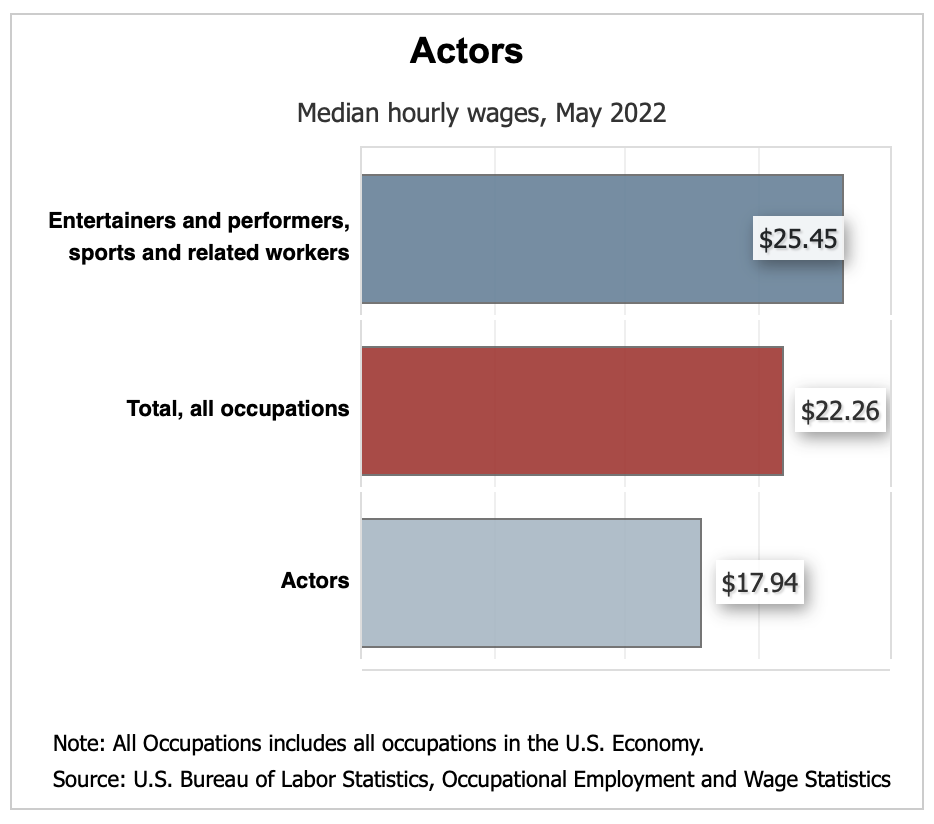What Should I Expect As An Actor?
What kind of training is required? What’s the money like? How much experience do you need? Where can you get experience?
The following is a brief look at the nature of acting.
It is based upon the text from the U.S. Department of Labor, Bureau of Labor Statistics, Occupational Outlook Handbook on the internet at http://www.bls.gov/ooh/entertainment-and-sports/actors.htm.
Quick Facts:
- 2022 Median Pay $17.94 per hour
- Typical Entry-Level Education Some college, no degree
- Work Experience in a Related Occupation None
- On-the-job Training Long-term on-the-job training
- Number of Jobs, 2022 78,100
- Job Outlook, 2022-32 3% (As fast as average)
- Employment Change, 2022-32 2,500
What Actor’s Do
Actors express ideas and portray characters in theater, film, television, and other performing arts media. They interpret a writer’s script to entertain or inform an audience.Duties
Actors typically do the following:
- Read scripts and meet with agents and other professionals before accepting a role
- Audition in front of directors, producers, and casting directors
- Research their character’s personal traits and circumstances to portray the characters more authentically to an audience
- Memorize their lines
- Rehearse their lines and performance, including on stage or in front of the camera, with other actors
- Discuss their role with the director, producer, and other actors to improve the overall performance of the show
- Perform the role, following the director’s directions
Most actors struggle to find steady work, and few achieve recognition as stars. Some work as “extras”—actors who have no lines to deliver but are included in scenes to give a more realistic setting. Some actors do voiceover or narration work for animated features, audiobooks, or other electronic media.
In some stage or film productions, actors sing, dance, or play a musical instrument. For some roles, an actor must learn a new skill, such as horseback riding or stage fighting.
Most actors have long periods of unemployment between roles and often hold other jobs in order to make a living. Some actors teach acting classes as a second job.
Work Environment
Actors held about 78,100 jobs in 2022. The largest employers of actors were as follows:
- Self-employed workers - 26%
- Motion picture and video industries - 25%
- Accounting, tax preparation, bookkeeping, and payroll services - 22%
- Amusement parks and arcades - 8%
- Theater companies and dinner theaters - 6%
Work assignments are usually short, ranging from 1 day to a few months, and actors often hold another job in order to make a living. They are frequently under the stress of having to find their next job. Some actors in touring companies may be employed for several years.
Actors may perform in unpleasant conditions, such as outdoors in bad weather, under hot stage lights, or while wearing an uncomfortable costume or makeup.
Work Schedules
Work hours for actors are extensive and irregular. Early morning, evening, weekend, and holiday work is common. Some actors work part time. Few actors work full time, and many have variable schedules. Those who work in theater may travel with a touring show across the country. Film and television actors may also travel to work on location.
How to Become an Actor
Actors typically enhance their skills through formal education, and long-term training is common.
Education
Actors typically enhance their skills through formal education. Those who specialize in theater may have a bachelor’s degree in a field such as performing arts, but a degree is not required.
Although some people succeed in acting without getting a formal education, most actors acquire some formal preparation through a theater company’s acting conservatory or a university drama or theater arts program. Students can take college classes in drama or filmmaking to prepare for a career as an actor. Classes in dance or music may help as well.
Actors who do not have a college degree may take acting or film classes to learn their craft. Community colleges, acting conservatories, and private film schools typically offer these classes. Many theater companies also have education programs.
Important Qualities
Creativity: Actors interpret their characters’ feelings and motives in order to portray the characters in the most compelling way.
Memorization skills: Actors memorize many lines before filming begins or a show opens. Television actors often appear on camera with little time to memorize scripts, and scripts frequently may be revised or even written just moments before filming.
Persistence: Actors may audition for many roles before getting a job. They must be able to accept rejection and keep going.
Physical stamina: Actors should be in good enough physical condition to endure the heat from stage or studio lights and the weight of heavy costumes or makeup. They may work many hours, including acting in more than one performance a day, and they must do so without getting overly tired.
Reading skills: Actors must read scripts and be able to interpret how a writer has developed their character.
Speaking skills: Actors—particularly stage actors—must say their lines clearly, project their voice, and pronounce words so that audiences understand them.
In addition to these qualities, actors usually must be physically coordinated to perform predetermined, sometimes complex movements with other actors, such as dancing or stage fighting, in order to complete a scene.
Training
It takes many years of practice to develop the skills needed to be a successful actor, and actors never truly finish training. They work to improve their acting skills throughout their career. Many actors continue to train through workshops, rehearsals, or mentoring by a drama coach.
Every role is different, and an actor may need to learn something new for each one. For example, a role may require learning how to sing or dance, or an actor may have to learn to speak with an accent or to play a musical instrument or sport.
Many aspiring actors begin by participating in school plays or local theater productions. In television and film, actors usually start out in smaller roles or independent movies and work their way up to bigger productions.
Advancement
As an actor’s reputation grows, he or she may work on bigger projects or in more prestigious venues. Some actors become producers and directors.
Pay

The median hourly wage for actors was $17.94 in May 2022. The median wage is the wage at which half the workers in an occupation earned more than that amount and half earned less. The lowest 10 percent earned less than $13.20, and the highest 10 percent earned more than $109.46.
In May 2022, the median hourly wages for actors in the top industries in which they worked were as follows:
- Theater companies and dinner theaters - $23.14
- Amusement parks and arcades - $17.94
- Motion picture and video industries - $16.70
- Accounting, tax preparation, bookkeeping, and payroll services - $15.79
Work hours for actors are extensive and irregular. Early morning, evening, weekend, and holiday work is common. Some actors work part time. Few actors work full time, and many have variable schedules. Those who work in theater may travel with a touring show across the country. Actors in movies may also travel to work on location.
Union Membership
Compared with workers in all occupations, actors had a higher percentage of workers who belonged to a union.
Many film and television actors join the Screen Actors Guild-American Federation of Television and Radio Artists (SAG-AFTRA), whereas many stage actors join the Actors’ Equity Association. Union membership can help set work rules, and assist actors in receiving benefits and bigger parts for more pay. Union members must pay yearly dues, which can be expensive for actors who are beginning their careers.
Job Outlook
Employment of actors is projected to grow 3 percent from 2022 to 2032, about as fast as the average for all occupations.
Employment
Streaming services and other online-only platforms are expected to drive employment demand for actors as the number of shows produced and the volume of content increase.
However, lack of funding may reduce the number of performances held at theaters, which would impact employment of actors in these establishments. Theaters with more stable sources of funding and well-known plays and musicals may be less susceptible to fluctuations in employment demand.
Information about similar ocuupations: https://www.bls.gov/ooh/entertainment-and-sports/actors.htm#tab-8
RESOURCES
Of course a website cannot tell you all the information you need to know about preparing yourself to be an actor: unions, contracts, agents, casting, auditions, and the myriads of other things actors should learn about the acting business.
Below are a number of resources that will help you learn about such things to get you on the right road to becoming a successful actor.


Copyright © All rights reserved.
Website designed by Dave-Blank-Website-Design.com







